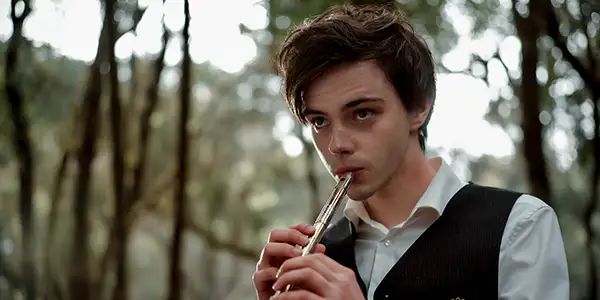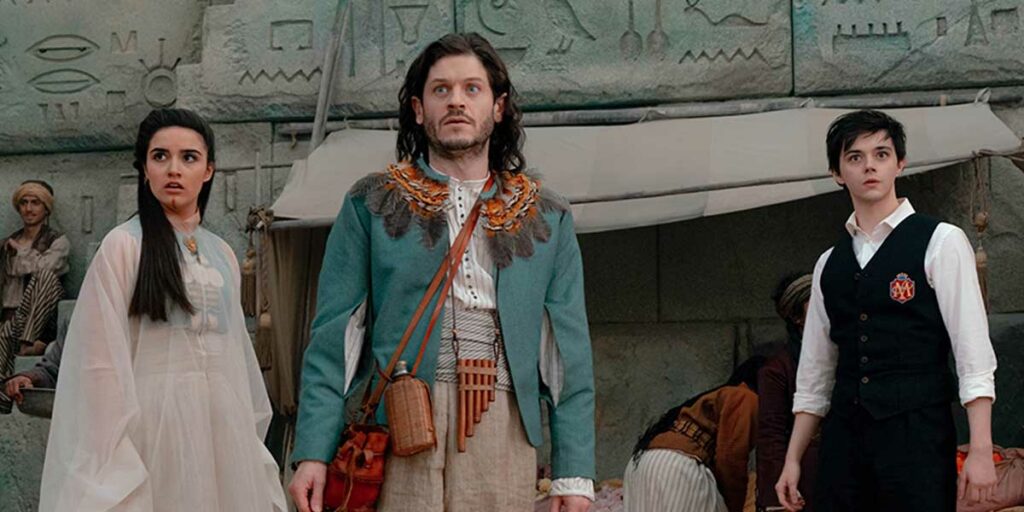Mozart meets Harry Potter in The Magic Flute, a fantastical adventure that boldly mixes magic with classical music.
From the moment I first saw the trailer for this film, The Magic Flute immediately caught my interest. . It’s based on Wolfgang Amadeus Mozart’s renowned opera, so I was over the moon to see a cinematic re-edition of one of my classical pieces. As someone who grew up with various operas, I have always wondered why there was little to no retelling on the screen of the most prominent operas, most of which can exclusively be seen as theatre productions. The answer is, of course, layered and complex, as transposing an opera, originally envisioned as a form of theatre, to such a modern medium must come with its unique set of challenges. But this film was brave enough to attempt that, creating a unique and fascinating product.
The Magic Flute starts with its protagonist, Tim Walker (Jack Wolfe), as he travels to a notorious boarding school just as the auditions for Mozart’s Magic Flute are about to take place. Tim is introduced to some of his classmates, including his roommate Paolo Tocci (Elliot Courtiour), the son of a famous singer Anton Milanese (Amir Wilson), and Sophie (Niamh McCormack) who goes to the girl side of the school. But during the night, Tim embarks on an entirely different journey in the fantastical world of the opera itself, where he becomes Prince Tamino. Much like in Mozart’s opera, he is enlisted by the Queen of the Night (Sabine Devieillhe) to rescue Pamina (Asha Banks) from Sarastro (Morris Robinson) with the help of Papageno (Iwan Rheon).
The film establishes its worldbuilding very well and quickly: at the beginning of the movie, we soon have all the information we need not only about the school Tim goes to but also about the magical system that drives the plot forward. This allows The Magic Flute to grab its audience’s attention really quickly with its stunning visual effects and cinematography, both of which are particularly evident in the magical land that Tim visits every night. It is a movie that looks good, which adds a fascinating element to the portrayal of Mozart’s opera.
Throughout the film, it feels like music is not only the catalyst behind the entire plot but also the main motif of the film. The music starts as soon as the school is mentioned and keeps guiding us as Tim arrives to the Mozart International School and finds the clock in the library that will take him to the world of Mozart’s magic flute. It feels like the score in The Magic Flute has hinted at this all along, almost drawing an invisible string between Mozart’s opera and the protagonist of the film, one that will eventually be fulfilled over the course of the movie.

I also thought The Magic Flute made a very bold choice in translating Mozart’s arias into English. Originally, Mozart’s opera is all in German, but in this film, all the lyrics have been changed to English. This is understandable as it makes the music much more organic with the spoken text and it is a lot easier to understand, especially for those unfamiliar with the opera. It is also a very good translation, which must have been hard to do as it keeps the original meaning of the arias but works within their rhythm and music. It is an ambitious choice, one that takes a little bit of getting used to if you are familiar with Mozart’s opera, but that ultimately works.
I loved the constant movement between the real world and the magical one as Tim only goes to the magic flute world during the night and is forced to come back to his reality during the day. This allows The Magic Flute to keep things interesting throughout the film, especially for those in the audience who might already know the plot of Mozart’s opera and thus can imagine what comes next, at least in the fantastical world where Tim becomes Tamino for a few hours. It also allows us to gain an insight into Tim’s journeys in these two worlds, both of which are given equal importance in the movie.
I would, however, have liked to see the characters, or at least the events, that we see in the real world mirrored in the world of the magic flute. Especially since most of the cast is made of non-opera singers, I thought it would have been a lot more powerful to have the people Tim meets at school become the cast of this fantasy world, thus highlighting the parallelisms between the two, which seems to fall short by the end of the film. It would have also allowed The Magic Flute to delve deeper into its supporting characters and their relationship with Tim which feels somewhat forced at the end of the movie, especially that between him and Sophie, as they had little screen time to be explored.
The biggest flaw of The Magic Flute is the lack of opera singers in the cast, which is particularly jarring for a film that features so many arias. On one hand, it is fascinating to hear actors who have not received opera training attempt some of the famous songs in the classic repertoire, which is particularly successful for Tim and Pamina. On the other, I could not help but feel like this caused an underwhelming delivery of some of these beautiful musical pieces. There are, of course, some notable exceptions, namely Sarastro and the Queen of the Night, who are both lyrically trained. The latter is particularly impressive in the film’s version of the famous aria “Der Hölle Rache”, a famously demanding piece for coloratura sopranos to perform.
The Magic Flute is a clever way of introducing Mozart’s most famous opera to those unfamiliar with it, but we can hardly expect it to be a faithful retelling of the opera itself. Ultimately, it is an ambitious movie with a fascinating premise that makes it very exciting: we have seen a lot of fantasy movies aimed at young adults, but none of those ever had a retelling of Mozart’s most famous operas. It is a film that dares to move across genres and beyond the confines of its own genre, thus introducing its target audience to something new that they were most likely not familiar with and giving a new life to classical operas.
Signature Entertainment presents The Magic Flute on Digital Platforms in the UK from November 6, 2023. In the US, the film is now available to watch on digital and on demand.

